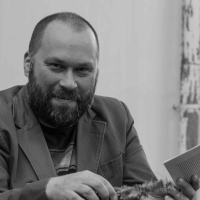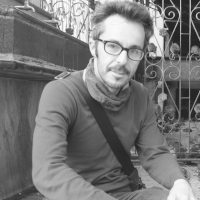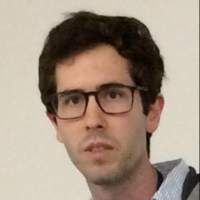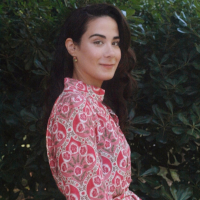Bochum-Grenoble Memory Colloquium
2022-2023

First semester

Alex Moran
(University of Oxford)
The metaphysics of memory: Relationalism and representationalism
16:15-17:45 CEST (UTC+02:00), 13 October 2022
Abstract: If the metaphysics of memory perfectly paralleled the metaphysics of sense experience, you might expect the imagistic (mental image) theory of memory to be the most metaphysically extravagant and fraught with the deepest metaphysical complexities. Without really getting into the details of that theory, however, I'll try to make a case for thinking that that isn't so. The most metaphysically "innocent" theory is generalist representationalism. Then we have "singular content" representationalism" and "relationalism" - and both are extravagant to pretty much equal extents, albeit for different reasons. The oft-heard complaint that representationalism is the metaphysically more conservative choice therefore just doesn't work in a singularist setting - and since singularism is the more plausible form of representationalism, there's rather little of substance to this as a line of argument against relationalism at all.

Vilius Dranseika
(Jagiellonian University)
Non-factive memories and folk beliefs about phenomenology of memory
16:15-17:45 CEST (UTC+02:00), 27 October 2022
Abstract: In this talk, I will do three things. First, I will present a set of studies documenting ascriptions of remembering that violate the factivity constraint (namely, ascriptions of remembering in situations, in which the 'remembered' event did not in fact occur). Second, I will present some data on folk beliefs about phenomenology of memory. Third, I will explore how folk beliefs about phenomenology of memory can shed some light on non-factive ascriptions of remembering.

Saulius Geniusas
(Chinese University of Hong Kong)
Memory and self-awareness (from a phenomenological point of view)
16:15-17:45 CET (UTC+01:00), 10 November 2022
Abstract: The paper is guided by the idea that the established phenomenological distinction between reflective and prereflective self-awareness needs to be supplemented with more subtle distinctions between different modes of prereflective self-awareness. In this lecture, I focus on different modes of self-awareness that accompany different kinds of memory. I present a brief taxonomy of memory and further focus on the distinct kinds of self-awareness that accompany "observer memory" and "field memory."" I address different kinds of self-awareness in simple and complex episodic recollections as well as clarify the distinction between explicit and implicit self-awareness in episodic recollections. I show how intuitive recollection differs from other modes of presentification (Vergegenwärtigung), what it means to think of intuitive recollection as a mode of apperception, as well as engage in the question whether memory is a construction or a preservation. Of central importance in this context is a clarification of the temporal nature of experience and especially of the temporal transition from impressions to retentions, from retentions to sedimentation (forgetfulness), and from sedimentation to recollection (Wiedererinnerung).

Alfredo Vernazzani
(Ruhr-Universität Bochum)
Memory and the phenomenology of aspect seeing
16:15-17:45 CET (UTC+01:00), 24 November 2022
Abstract: An influential line of thought — represented by Strawson (1982) and Wollheim (1980) — takes aspects to either be identical with or constitutively involve concepts. Consider the case of Jastrow’s figure. According to conceptualism about seeing-as, for you to see it as a duck or as a rabbit, you must possess and bring to bear the concepts of DUCK and RABBIT on your perceptual experience. Conceptualism seems able to do justice to Wittgenstein’s claim that aspects seem to possess features of both thought and seeing (PPF 140, 182), as well as to the Kantian thesis (1781/1787) that the unity and sense of our experiences is at least in part a subjective contribution. Recently, Avner Baz (2016, 2018, 2020a, 2020b) has sought to rehabilitate a non-conceptual account of seeing-as in the spirit of Travis’s naïve realism (2013, 2015, 2016). Basing on Travis’s reflections on concepts and experience, Baz argues that aspects lack the generality of concepts and that they exhibit conceptual indeterminacy. His positive thesis is that aspects are Gestalt-like internal relations, and that this vindicates the Kantian thesis in a non-conceptual way. Baz’s reflections are insightful and brilliantly illuminate the philosophical intricacies of aspect perception. However, I argue that he has ultimately failed to produce a convincing account of aspects. First, I point at some difficulties with Baz’s own positive account, and in particular the trouble in accommodating Wittgenstein’s phenomenological remarks on aspects. Next, taking stock of Baz’s remarks and building on my previous point, I suggest that the phenomenology of noticing aspects constitutively involves the active mobilization of memory structures, not limited to mere semantic knowledge. My account thus suggests that memory plays an important role in determining the phenomenal character of (at least some) visual experiences; furthermore, it enables us to recover an account of the meaningfulness of experience close to Bartlett’s (1932).

Amy Kind
(Claremont McKenna College)
Accuracy in imagining
16:15-17:45 CET (UTC+01:00), 08 December 2022
Abstract: The idea that imagination should be thought of as a skill has in recent years become increasingly common in philosophy of imagination. If we accept this idea, then it seems to follow that different people will be better at imagining than other people and, correspondingly, that some particular imaginings are better than others. But what factors are we evaluating when making a judgment on this score? While there are undoubtedly many dimensions along which one imagining might be said to be better than another, in this paper I focus on just one such dimension: Accuracy. What does it mean for one imagining to be more accurate than another? After first explaining when and how accuracy is relevant in imaginative contexts, I give an account of accuracy that connects it to imaginative aim.

Kengo Miyazono and Uku Tooming
(Hokkaido University and University of Tartu)
An argument for generationism about memory justification
16:15-17:45 CET (UTC+01:00), 22 December 2022
Abstract: Memory is often seen as epistemically preservative in that it only preserves the justification that originates in some other, non-mnemonic source. The opposite view, generationism, according to which memory can also generate justification on its own, has been defended by a variety of authors in recent years. For memory to be epistemically generative, there have to generative cases: memories which justify beliefs where the justification is not due to some prior source. The cases of memory that have been thus far suggested as candidates for generative cases can be shown to be at best only superficially generative. In our paper, we consider two new candidates for epistemically generative cases of memory, memories resulting from event completion and memory consolidation, and argue that, although these cases are the most promising candidates, whether they count as generative cases of memory in particular depends on how to understand the relationship between memory and imagination.

Javier Gomez-Lavin
(Purdue University)
Salvaging the mosaic ontology underlying working memory: A detour through productive pessimism
16:15-17:45 CET (UTC+01:00), 19 January 2023
Abstract: he aim of this talk is to motivate us to reconsider and reuse an old way of thinking about thinking. From Gall’s early worries about the neural localizability of memory, through Ladd and James’s debates over the application of terms from natural science to the nascent field of psychology, to Fodor’s more recent broadside against the very existence of cognitive science, we can draw out a long, maligned thread of pessimism regarding our ability to explain facets of the mind. I argue that, when properly handled, this pessimism can be used productively to construct a more accurate ontology of cognition. I demonstrate this strategy with the case of working memory—our ability to keep information in mind and transform it in the service of behavior. Retaining those twin functions of maintenance and manipulation at the core of working memory forces its proponents to confront a dilemma: either working memory covers the many mechanisms that do realize the maintenance and manipulation of information, or it singles out a chosen mechanism. Following either horn leaves working memory unable to explain the many cognitive phenomena—from reasoning to consciousness—with which it’s charged. By tracing working memory’s historical roots we can identify the uncritical laundering of rich philosophical concepts, e.g. volition, into the construct of working memory, ultimately resulting in its inherent explanatory overreach. Harnessing this pessimism buys us the conceptual space needed to decouple working memory’s explanatory posture from the longstanding work that it has done to corral psychological and neuroscientific results that capture the many ways that creatures and brains maintain and manipulate information in the service of behavior. By way of Poldrack and colleagues’ Cognitive Atlas ontology, I show how we can begin the process of sifting through the present working memory literature to piece together a mosaic that reflects the diverse ways that we maintain and manipulate information, some of which may reach beyond the brain, realized by speech and symbols shared across people. Given the ubiquity and importance of these functions for cognition, such a mapping brought about by our initial pessimism may help us glimpse a better picture of cognition.

Chris McCarroll
(National Yang Ming Chiao Tung University)
Mourning a death foretold: Memory and mental time travel in anticipatory grief
16:15-17:45 CET (UTC+01:00), 02 February 2023
Abstract: Grief is a complex emotional experience or process, which is typically felt in response to the death of a loved one, most typically a family member, child, or partner. Yet the way in which grief manifests is much more complex than this. The things we grieve over are multiple and diverse. We may grieve for a former partner after the breakup of a relationship; parents sometimes report experiencing grief when their grown-up children leave the family home. We can also experience grief for people we have never met. Indeed, it is not just persons that we may grieve for. People report feeling grief over the death of their pets, or about the destruction the natural environment. In all these cases one factor that seems to stand out is loss. Despite being about very different things, these various forms of grief all involve a loss of some sort. Yet there is a further aspect of grief, which, on the face of it, does not quite follow this pattern. Grief can also be experienced before a loss has occurred. Grief can be experienced while the person that one is grieving for is still living and before one has (fully) suffered the loss. This phenomenon is known as anticipatory grief. The experience of anticipatory grief is a complex phenomenon, which resists easy classification. Nonetheless, I suggest that mental time travel, our ability to mentally project ourselves into the personal past (episodic memory) and personal future (episodic prospection), is a key mechanism that underpins experiences of anticipatory grief. Anticipatory grief can still be understood in terms of loss, but it is a loss that is brought to mind through memory and imagination.
Second semester

Nazım Keven
(Bilkent University)
Can episodic memory deter cheating and promote altruism?
16:15-17:45 CEST (UTC+02:00), 4 April 2023
Abstract: Episodic memory gives us the ability to mentally travel back in time to revisit and relive past experiences. Recent years have seen increased interest in the adaptive function of episodic memory. According to the orthodox view, episodic memory should be considered part of a constructive system for simulating the future for sophisticated foresight and flexible planning. In this talk, I offer a novel alternative. In my view, episodic memory provides invaluable information about the past deeds of others that allow us to identify reliable and trustworthy partners and avoid dealing with cheaters. Theoretical models reveal that cooperation in groups can be maintained if potential partners use information about an individual’s past behavior to guide their behavior towards that individual. In these types of reputation-based models of human cooperation, whereas individuals with a history of cheating are ostracized, individuals with a history of cooperative behaviors flourish. Against this theoretical background, it is possible to see a function of episodic memory in facilitating information exchange about others, helping group members make effective partner choices, and avoiding the risk of interacting with cheaters. If correct, episodic memory may have played a significant role in the evolution of human cooperation.

Íngrid Vendrell-Ferran
(University of Marburg)
Empathy, imagination, and memory: How the simulation theory can explain that we empathize with emotions we have never experienced
16:15-17:45 CEST (UTC+02:00), 18 April 2023
Abstract: According to a widespread view, the simulation theory (ST) of empathy cannot explain how it is possible that we empathize with emotions we have never experienced. Indeed, if – as ST suggests – empathy is based on a re-enactment of the other’s emotions, empathy requires that we already know the emotion to re-enact. If we do not know the emotion, then we do not know what we have to re-enact and, as a result, empathy is not possible. The aim of my talk is to show that proponents of the simulation theory of empathy can avoid the objection using some findings of current imagination research. In fact, as I shall argue, by resorting to memories, our phenomenal imagination can make us accessible the phenomenal properties of emotions we have never experienced. If this is possible, then the objection against ST should be dismissed.

Andrea Blomkvist
(London School of Economics)
Disconnecting the dots: Encoding the episodic memory engram.
16:15-17:45 CEST (UTC+02:00), 2 May 2023
Abstract: Memory is central to cognition. It allows us to learn new tasks, navigate the world, and make decisions based on past experience. There is general agreement that when we experience an event, an engram is created, which encodes information from the event, and later enables us to retrieve these details. But what is the nature of this engram, and how is it able to store information? My aim in this talk is to present a novel view of the engram based on recent advances in optogenetics. The orthodox view of engram encoding claims that the engram is stored in a neural network in virtue of connection strengths between neurons, and that patterns of activation instantiate different episodic memories. This implies that the reactivation of synaptic connections are vital for retrieving a memory. I present evidence from optogenetics which suggests that this is not the case, hence putting pressure on the idea that the engram is stored in virtue of connection strengths. Optogenetics is a technique whereby individual neurons can be tagged and then reactivated artificially. For example, experiments with mice expose them to a chamber where they receive foot shocks (fearful condition), after which experimenters can reproduce the fearful behaviour in a novel chamber by artificially reactivating the neurons which were activated in the original chamber. I argue that experimental results indicate that memory resides inside the neuron, as (1) reactivating the neuron reproduces the encoded behaviour. Another experiment tests whether inhibiting the consolidation process, widely thought of as necessary to stabilise the engram, prevents the artificial reactivation of memory. I argue that results here also suggest that memory resides inside the neuron, as (2) inhibiting the consolidation process does not negatively affect the reproduction of the behaviour. Hence, results from optogenetics speak against the orthodox view of engram storage. Having put the new view on the table, I highlight how there are still many details that need to be ironed out before it is as explanatorily powerful as the orthodox view, and I suggest possible fruitful ways forward.

Sofiia Rappe and Markus Werning
(Ruhr-Universität Bochum)
Episodic memory and causal reasoning through counterfactuals.
16:15-17:45 CEST (UTC+02:00), 9 May 2023
Abstract: Over the past several years, there has been a shift in researchers’ thinking about the functional role of episodic memory (Klein, 2013). Rather than focusing on how memory represents the past, recent literature often presents memory as ultimately dealing with the future – helping the organism to anticipate events and increase its adaptive success (Suddendorf & Corballis, 2007). We claim that episodic memory does yield adaptive success because of its crucial role in causal reasoning. To causally reason whether event A caused event B, the subject needs to cognitively evaluate a diachronic counterfactual of the following type: 1. If A had not happened at t1, B would not have happened at t. Such counterfactuals require episodic memory for their evaluation because, according to Lewis (1973), counterfactuals of type (1) are true just in case: 2. The not-A world closest to the actual world (where A and B occurred) is also a not-B world rather than a B-world. Current associative networks in AI struggle with diachronic temporal reasoning because these networks do not explicitly represent change but rather update representations as new information comes along (Hoerl & McCormack, 2019). Second, they learn by altering the weights/strength of connections through accumulating data over time. This approach significantly differs from human learning, which, in some instances, only requires single examples and allows rapid, radical re-evaluation of the causal relationships between events. Our paper presents a causal inference model based on the predictive processing framework of brain functioning (Clark, 2013, 2015; Hohwy, 2013; Friston 2005, 2010; Rao & Ballard, 1999) and minimal trace account of episodic memory (Werning, 2020). According to our model, because of its truth condition (2), evaluating counterfactuals of type (1) involves a) episodic memory to construct a scenario of the past (Cheng, Werning, Suddendorf, 2016), b) negation of the target event A in that scenario, and c) evaluation of the closeness relation between the newly attained non-A scenario and the remembered scenario. For example, to understand that the fact that your train was 30 minutes late caused you to miss the flight (rather than a 10-minute queue at the airport), you need to simulate the world as it existed when you expected the train to arrive according to the plan (a). Then, you need to simulate a world where the train did not get delayed by negating that event in the respective scenario (b). Finally, using semantic knowledge, you let the scenario unfold in time and ask yourself whether you would still have missed the flight or not (c).

Arieh Schwartz
(Ben Gurion University)
Mapping content
16:15-17:45 CEST (UTC+02:00), 30 May 2023
Abstract: We understand ourselves, and one another, from a rational perspective, through the attribution of conceptualmental states: belief, desire, etc. The attribution of conceptual mental states allows for the rational explanation of behavior as the result of practical inference. Are all mental states conceptual in the way that belief is? Some philosophers argue that perceptual experience is non-conceptual. In this talk, (drawn from joint work with Nir Fresco,) I argue that cognitive maps, our internal allocentric representations of the environment, comprise another important class of non-conceptual mental states. To this end, I shall present relevant discoveries of navigation science, evaluate extant arguments that cognitive maps are non-conceptual, and provide original arguments for that conclusion. There are two popular understandings of what it is for a mental state to be non-conceptual, the content view and the state view. While the former plausibly implies the latter, the converse remains controversial. Thus, I shall offer one argument to proponents of the content (and state) view(s), and a separate argument that can also appeal to those who endorse the state view and deny the content view.

Cesar Schirmer dos Santos
(Federal University of Santa Maria)
Conflicts of integration in philosophy of memory as metalinguistic negotiations.
16:15-17:45 CEST (UTC+02:00), 27 June 2023
Abstract: In the last years, philosophy of memory became an established research area with established debates. Two of these debates are causalism versus simulationism and continuism versus discontinuism. These debates generated, as by-products, many conceptual and theoretical advances in the study of the metaphysics and epistemology of memory. Still, none of these debates have a clear winner. The stalemate situation in the case of both debates made some philosophers of memory wonder whether these debates were metaphilosophical. In the most promising higher-order reading of the above-mentioned debates, they are cases of conflict of integration rather than real disagreement. Concerning this proposal, I believe that theoretical integration at different levels of inquiry is a challenge, but by reading these disputes as metalinguistic negotiations, we find space for substantive disagreement between the participants of these debates.

Andrea Rivadulla Duró
(University of Antwerp/University of Geneva)
Emotion, iconicity, and the function of episodic memory.
16:15-17:45 CEST (UTC+02:00), 11 July 2023
Abstract: Episodic memory shapes our decisions and expectations, often shadowing propositional information. In this talk, I shed light on the underlying mechanisms behind the supremacy of episodic memories over propositional memories in foreseeing scenarios. I argue that this supremacy is explained by a preference for the iconic format. I support this argument with compelling evidence from a range of phenomena highlighting the prioritization of iconic information in emotional processing. Analyzing how representational formats affect emotional processing can elucidate the complex integration and prioritization of memories in decision-making. In turn, the distinctive role of iconicity in sparking emotions explains the resistance of emotionally-charged episodic memories to semanticization, and highlights the fundamental role of episodic memory in our emotional lives.